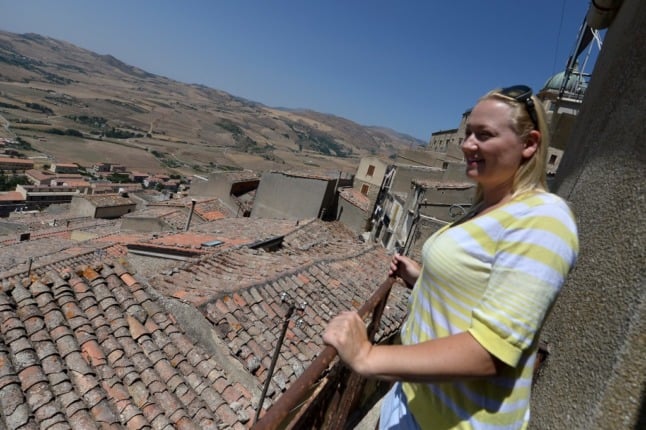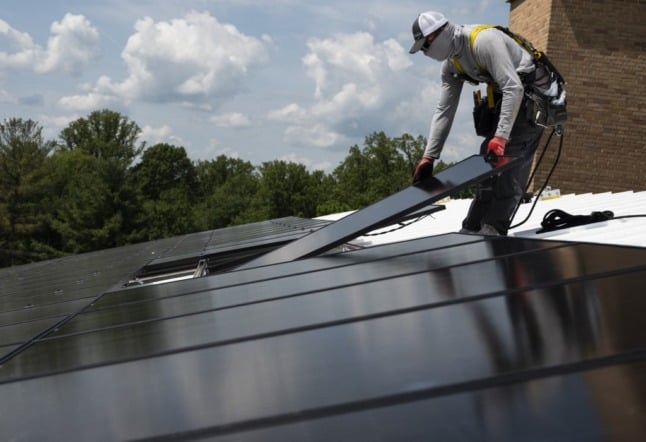How Italy's building 'superbonus' has changed in 2022

The Italian government has announced further extensions to its popular building 'superbonus' scheme in 2022. Here's what those buying and renovating property need to know about the latest changes and deadlines.
Italy first introduced the ‘superbonus 110‘ in May 2020 to restart a sluggish economy following the impacts of the pandemic, offering homeowners a tax deduction of up to 110 percent on expenses related to making energy upgrades and reducing seismic risk.
Towards the end of 2021, property owners were left concerned about how it would be rolled on into 2022 and whether they would be able to finish their renovation projects in time.
READ ALSO: Budget 2022: Which of Italy’s building bonuses have been extended?
To the relief of those carrying out works on their single unit family homes, the 'superbonus' on these properties has been approved for the whole of this year, as published in the Budget Law 2022 on December 30th, 2021.
Based on the government's budget measures for 2022 and the latest reforms, here's how the superbonus has been extended for 2022 following its introduction in the Relaunch Decree (decreto rilancio) - and what it means for your home renovations.Single family homes
Even though the deadlines are different depending on the property type, the good news for those carrying out works on their single unit homes is that the superbonus has been extended throughout the whole of 2022 for this category.
This covers detached buildings or small villas, for example.
The Budget Law text had confirmed that the only requirement to accessing this bonus throughout the whole year is that 30 percent of works must be completed by June 30th 2022.

Photo by TIZIANA FABI / AFP
This has now been extended again to September 30th 2022, giving a bit more breathing space to those who've been stuck in queues due to builder shortages and bureaucratic delays.
On the other hand, if 30 percent of the jobs have still not been completed by the new deadline of September 30th 2022, this becomes the final deadline and no more state aid can be claimed for the rest of the year.
Previous talks of eligibility criteria have also been scrapped. Now there’s no requirement of only being able to access the bonus if it’s your first home and if you have an ISEE (the social-economic indicator of household wealth) of €25,000 maximum.
More good news for single family home owners is that there's no need to have registered the start of works, known as 'CILAS' (Comunicazione di Inizio Lavori Asseverata Superbonus), by September 30th 2021, as previously planned.
The 'CILAS' is an administrative procedure that requires the authorisation of an architect, engineer, surveyor or other qualified technician to request the bonus to begin renovation work.
READ ALSO: What will Italy’s new budget mean for you in 2022?
Since the deadline for this has been scrapped, depending on the scale of the jobs, it means property owners can claim the bonus for works beginning on their property now, as long as they adhere to the timescales noted.
Condominiums and owners of multiple unit buildings
There's even more time to benefit from the superbonus for these categories.
Condominiums, owners of buildings consisting of two to four units and third sector organisations will be able to take advantage of the benefit until 2025, with a sliding scale: 110 percent remains valid until 31 December 2023, dropping to 70 percent in 2024 and 65 percent in 2025.
Those with multiple unit properties - such as a main home and a warehouse (magazzino), for example - fall into this group. Not only is there more time to get state aid with renovating property, there are also opportunities to claim some bonuses more than once.

Funds to install solar panels have also been extended into 2022. Photo by Andrew CABALLERO-REYNOLDS / AFP
Deadlines at a glance
Here's a breakdown of who can access the superbonus 110 and for how long:
- Single family homes - September 30th 2022 or December 31st 2022 if 30 percent of works are completed by the first deadline.
- Multiple unit (2-4) properties - December 31st 2023. The bonus reduces to 70 percent by December 31st 2024 and 65 percent by December 31st 2025.
- Condominiums - December 31st 2023. The bonus reduces to 70 percent by December 31st 2024 and 65 percent by December 31st 2025.
- Third sector - December 31st 2023. The bonus reduces to 70 percent by December 31st 2024 and 65 percent by December 31st 2025.
- Social housing - June 30th 2023 or December 31st 2023 if 60 percent of the works are completed by the first deadline.
- Sports associations - June 30th 2022 or December 31st 2022 if 30 percent of works are completed by the first deadline.
What can you use the superbonus for?
You can apply for government financial help for thermal insulation work, replacement of winter air-conditioning systems and anti-seismic interventions.
The 2022 budget law also extended the bonus for installation of solar-panels and electric car charging points into 2022.
READ ALSO:
- What you need to know about installing solar panels on your home in Italy
- Italy’s building bonus: Can you really claim back the cost of renovating property?
- Do you have to be Italian to claim Italy’s building bonuses?
How you can claim the superbonus 110
One of the most anticipated changes was how people could continue to access this bonus.
There have been various regulatory changes already in 2022 when it comes to the superbonus.
Two ways to access the funds – transferring the credit (cessione del credito) or discount on the invoice (sconto in fattura) – have recently become stricter.
The changes followed vast amounts of fraudulent claims to the bonus, leading the government to introduce more clauses to the rules and complicate the bureaucracy even further.
Tax deduction is also still an option for those who want to offset high taxes on their income, spread out over five years. This route is only available to Italian residents paying income tax, known as ‘IRPEF’.
Further details are expected on the methods of accessing the bonus when the final version of the energy and investment decree (decreto energia e investimenti) is published.
Anti-fraud measures
Property owners hoping to take advantage of the superbonus will need to be aware of anti-fraud legislation recently brought in by the government.
The anti-fraud decree was published on November 11th and was incorporated into the 2022 budget.
It came in after Italy's Inland Revenue Agency (Agenzia delle Entrate) uncovered some 800 million fictitious claims worth at least €1 billion, reported financial newspaper Il Sole 24 Ore.
READ ALSO: How to stay out of trouble when renovating your Italian property
Because of this, from now on a compliance certificate will be required when accessing the superbonus via either credit transfer or a discount on the invoice.
The anti-fraud decree requires that a qualified technician establishes the fairness of the prices for the works, confirmed in an affidavit.
The company carrying out the work must demonstrate to the ENEA (National Agency for New Technologies, Energy and Sustainable Economic Development) that it has used materials that guarantee energy saving, and to the Revenue Agency that it has applied reasonable prices.
See more in The Local’s Italian property section.
Comments
See Also
Italy first introduced the ‘superbonus 110‘ in May 2020 to restart a sluggish economy following the impacts of the pandemic, offering homeowners a tax deduction of up to 110 percent on expenses related to making energy upgrades and reducing seismic risk.
Towards the end of 2021, property owners were left concerned about how it would be rolled on into 2022 and whether they would be able to finish their renovation projects in time.
READ ALSO: Budget 2022: Which of Italy’s building bonuses have been extended?
To the relief of those carrying out works on their single unit family homes, the 'superbonus' on these properties has been approved for the whole of this year, as published in the Budget Law 2022 on December 30th, 2021.
Based on the government's budget measures for 2022 and the latest reforms, here's how the superbonus has been extended for 2022 following its introduction in the Relaunch Decree (decreto rilancio) - and what it means for your home renovations.Single family homes
Even though the deadlines are different depending on the property type, the good news for those carrying out works on their single unit homes is that the superbonus has been extended throughout the whole of 2022 for this category.
This covers detached buildings or small villas, for example.
The Budget Law text had confirmed that the only requirement to accessing this bonus throughout the whole year is that 30 percent of works must be completed by June 30th 2022.

This has now been extended again to September 30th 2022, giving a bit more breathing space to those who've been stuck in queues due to builder shortages and bureaucratic delays.
On the other hand, if 30 percent of the jobs have still not been completed by the new deadline of September 30th 2022, this becomes the final deadline and no more state aid can be claimed for the rest of the year.
Previous talks of eligibility criteria have also been scrapped. Now there’s no requirement of only being able to access the bonus if it’s your first home and if you have an ISEE (the social-economic indicator of household wealth) of €25,000 maximum.
More good news for single family home owners is that there's no need to have registered the start of works, known as 'CILAS' (Comunicazione di Inizio Lavori Asseverata Superbonus), by September 30th 2021, as previously planned.
The 'CILAS' is an administrative procedure that requires the authorisation of an architect, engineer, surveyor or other qualified technician to request the bonus to begin renovation work.
READ ALSO: What will Italy’s new budget mean for you in 2022?
Since the deadline for this has been scrapped, depending on the scale of the jobs, it means property owners can claim the bonus for works beginning on their property now, as long as they adhere to the timescales noted.
Condominiums and owners of multiple unit buildings
There's even more time to benefit from the superbonus for these categories.
Condominiums, owners of buildings consisting of two to four units and third sector organisations will be able to take advantage of the benefit until 2025, with a sliding scale: 110 percent remains valid until 31 December 2023, dropping to 70 percent in 2024 and 65 percent in 2025.
Those with multiple unit properties - such as a main home and a warehouse (magazzino), for example - fall into this group. Not only is there more time to get state aid with renovating property, there are also opportunities to claim some bonuses more than once.

Deadlines at a glance
Here's a breakdown of who can access the superbonus 110 and for how long:
- Single family homes - September 30th 2022 or December 31st 2022 if 30 percent of works are completed by the first deadline.
- Multiple unit (2-4) properties - December 31st 2023. The bonus reduces to 70 percent by December 31st 2024 and 65 percent by December 31st 2025.
- Condominiums - December 31st 2023. The bonus reduces to 70 percent by December 31st 2024 and 65 percent by December 31st 2025.
- Third sector - December 31st 2023. The bonus reduces to 70 percent by December 31st 2024 and 65 percent by December 31st 2025.
- Social housing - June 30th 2023 or December 31st 2023 if 60 percent of the works are completed by the first deadline.
- Sports associations - June 30th 2022 or December 31st 2022 if 30 percent of works are completed by the first deadline.
What can you use the superbonus for?
You can apply for government financial help for thermal insulation work, replacement of winter air-conditioning systems and anti-seismic interventions.
The 2022 budget law also extended the bonus for installation of solar-panels and electric car charging points into 2022.
READ ALSO:
- What you need to know about installing solar panels on your home in Italy
- Italy’s building bonus: Can you really claim back the cost of renovating property?
- Do you have to be Italian to claim Italy’s building bonuses?
How you can claim the superbonus 110
One of the most anticipated changes was how people could continue to access this bonus.
There have been various regulatory changes already in 2022 when it comes to the superbonus.
Two ways to access the funds – transferring the credit (cessione del credito) or discount on the invoice (sconto in fattura) – have recently become stricter.
The changes followed vast amounts of fraudulent claims to the bonus, leading the government to introduce more clauses to the rules and complicate the bureaucracy even further.
Tax deduction is also still an option for those who want to offset high taxes on their income, spread out over five years. This route is only available to Italian residents paying income tax, known as ‘IRPEF’.
Further details are expected on the methods of accessing the bonus when the final version of the energy and investment decree (decreto energia e investimenti) is published.
Anti-fraud measures
Property owners hoping to take advantage of the superbonus will need to be aware of anti-fraud legislation recently brought in by the government.
The anti-fraud decree was published on November 11th and was incorporated into the 2022 budget.
It came in after Italy's Inland Revenue Agency (Agenzia delle Entrate) uncovered some 800 million fictitious claims worth at least €1 billion, reported financial newspaper Il Sole 24 Ore.
READ ALSO: How to stay out of trouble when renovating your Italian property
Because of this, from now on a compliance certificate will be required when accessing the superbonus via either credit transfer or a discount on the invoice.
The anti-fraud decree requires that a qualified technician establishes the fairness of the prices for the works, confirmed in an affidavit.
The company carrying out the work must demonstrate to the ENEA (National Agency for New Technologies, Energy and Sustainable Economic Development) that it has used materials that guarantee energy saving, and to the Revenue Agency that it has applied reasonable prices.
See more in The Local’s Italian property section.
Join the conversation in our comments section below. Share your own views and experience and if you have a question or suggestion for our journalists then email us at [email protected].
Please keep comments civil, constructive and on topic – and make sure to read our terms of use before getting involved.
Please log in here to leave a comment.